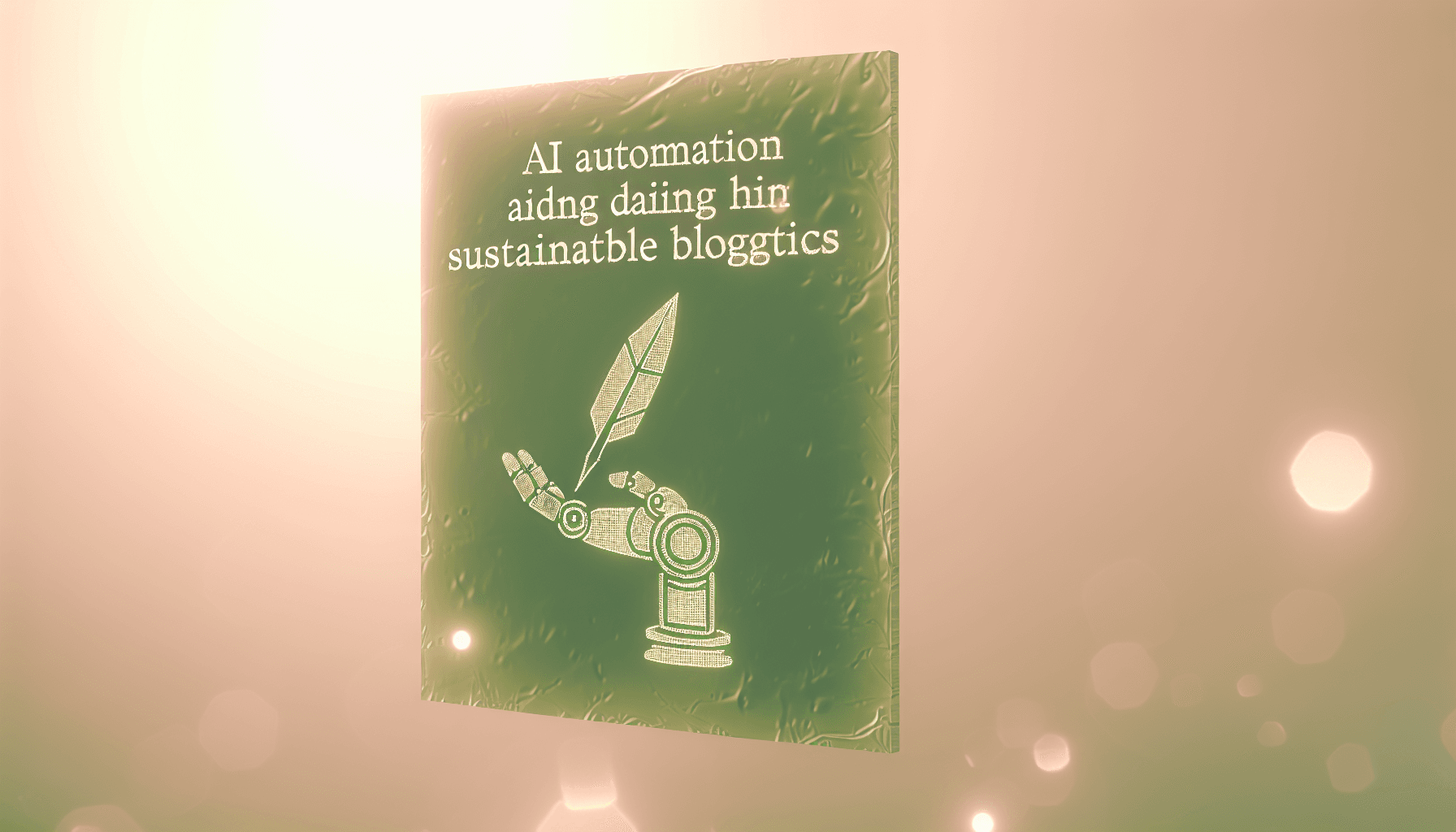
Transform Blogging with AI for Sustainability
Explore how AI automation enhances sustainable blogging, boosting SEO and content generation.
The digital age has undoubtedly revolutionized the way content is created, consumed, and managed. Among these transformations, the introduction of AI-powered blog automation has stood out, offering not just efficiency and scalability but paving the way for sustainable blogging practices. In this article, we delve into how AI automation supports sustainable blogging by enhancing SEO optimization, streamlining content generation, and ensuring effective blog management without overextending human and environmental resources.
The Environmental Impact of Blogging
Blogging, at its core, is an activity poised to influence and inform. However, the traditional labor-intensive approach to maintaining a blog can often result in a significant strain not only on human resources but also on the environment. The digital footprint of extensive research, editing, publishing processes, and the energy consumption associated with maintaining large content databases cannot be overlooked.
Statistics show that the information and communications technology (ICT) industry is responsible for approximately 2% of global carbon emissions. While blogs might seem negligible in the larger context, their cumulative impact is notable, especially when multiplied across millions of websites.
The integration of AI into blogging transforms this dynamic, allowing for more eco-friendly practices by reducing unnecessary workload on servers and providing effective content strategies that minimize redundant work.
How AI Optimizes Content for Sustainability
Enhancing SEO Optimization
AI-powered blog automation excels in handling SEO optimization tasks that traditionally require manual input. By analyzing vast amounts of data, AI algorithms can extract relevant keywords, predict trending topics, and evaluate user engagement metrics to continually refine content for better visibility.
Automating these tasks reduces the need for constant human intervention, thus saving energy and reducing the reliance on physical devices that require charging or cooling. Moreover, AI can update and recycle old content efficiently, breathing new life into existing posts without the need for extensive rewrites.
Streamlined Content Generation
Content generation through AI presents a paradigm shift from the exhaustive traditional methods. AI algorithms can assess previous successful posts and generate new content that adheres to established guidelines while injecting creativity and relevance.
Advantages of AI in content generation include:
- Efficient Keyword Research and Implementation: AI quickly identifies gaps or opportunities in content that align with current search engine trends, ensuring your blog stays competitive.
- Content Customization: Tailoring content to fit a diverse audience becomes feasible, addressing the needs of business owners, digital marketers, and bloggers with varying interests and preferences.
Ensuring Consistent Blog Management
AI doesn't just stop at creation; its capacities extend to robust blog management through automated publishing schedules and systematic updates.
- Automated Publishing: By managing publication calendars and utilizing flexible automation settings, AI ensures content is delivered timely and consistently, aligning with the peak times of audience engagement. This consistency helps build reader trust and loyalty without the need for constant manual oversight.
- API Integration and Support: This allows businesses to seamlessly integrate generated content with their existing systems, reducing workload and the potential for human error.
Driving Sustainability Through AI Integration
AI's role in sustainable blogging isn't confined to efficiency and content management; it also induces a strategic shift towards lower resource consumption — both digital and physical. The benefits realized through AI-aided blogging include:
- Reduction in Redundant Infrastructure: By optimizing server usage and reducing the need for ongoing manual content checks and updates, data centers can operate more efficiently, ultimately decreasing their environmental impact.
- Empowering Remote Workforces: AI enables a flexible editorial workflow, which allows contributors to work remotely with fewer resources, requiring less office space and energy consumption.
- Scalability With Responsibility: As businesses grow, so does their digital presence. AI ensures that this scalability doesn’t come at an unsustainable cost, as it allows companies to expand their content reach without proportionate increases in their carbon footprint.
Real-World Applications and Case Studies
Several industries have already embraced AI-driven blogging, showcasing real-world benefits beyond theoretical models.
A study by Content Marketing Institute revealed that organizations utilizing AI for content strategy experienced a 30% increase in ROI due to optimized processes and better-targeted content delivery. Similarly, digital marketing firms reported reduced content turnover times, enabling quicker adaptation to market changes while maintaining sustainability benchmarks.
Case Study: E-commerce Platform
A global e-commerce platform incorporated AI-powered blog automation to manage its multilingual content needs across 10 countries. The platform witnessed a 40% reduction in time spent on content curation and realized an energy saving of 20%, attributed to more efficient data handling and minimized server use.
By automating content localization and relying on AI to maintain SEO optimization, the company sustainably scaled its digital presence without depleting additional physical resources.
Looking Towards the Future
The potential for AI automation in supporting sustainable practices in blogging is vast and promising. As AI technologies continue to evolve, they will likely offer even more sophisticated tools to enhance efficiency and diminish the environmental footprint of digital content creation.
Future trends may involve further integration of AI with environmental data, allowing content management systems to adjust their operations based on real-time energy availability and consumption data. Enhanced machine learning models could predict and counteract digital resource wastage before it occurs, positioning AI not just as a tool for productivity but as a champion for digital sustainability.
In conclusion, AI-powered blog automation stands out not only for its immediate benefits in terms of efficiency and content quality but also for its broader role in advancing sustainable digital practices. As content creators and businesses worldwide seek to strike a balance between growth and environmental responsibility, AI beckons with solutions that promise to redefine the future of blogging — one sustainably managed post at a time.